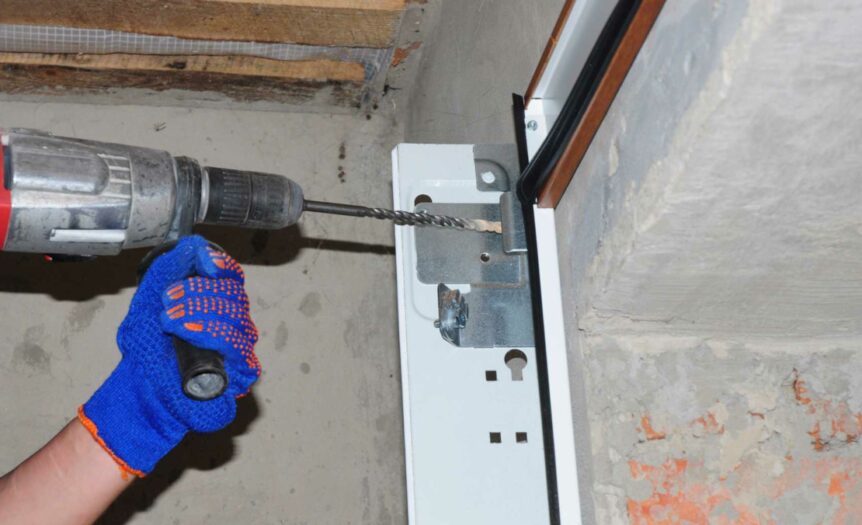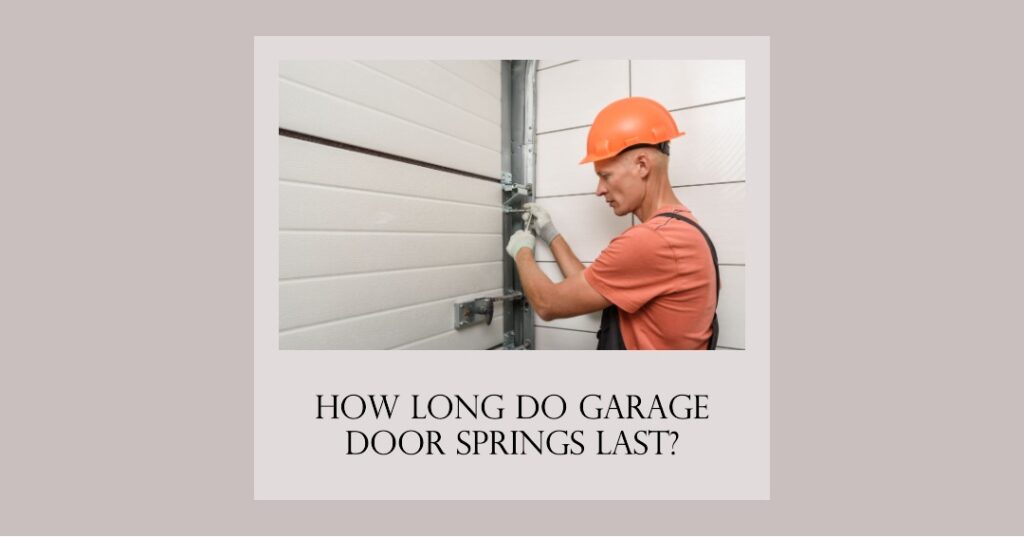Garage door springs play a crucial role in ensuring the smooth operation of your garage door system. However, many homeowners often overlook their importance and are left wondering how long these essential components last.
Key Takeaways
- The lifespan of a garage door spring depends on factors such as frequency of use, weight of the door, climate and weather conditions, and quality of installation.
- Standard manufacturer springs usually last around 18 months to 3-5 years or up to 10,000 cycles with normal use. However, upgrading to higher-quality oil-tempered or high-cycle springs can extend their lifespan significantly.
- Regular inspection and lubrication are crucial for maintaining garage door springs’ longevity. Signs that indicate replacement is needed include visible wear and tear or difficulty opening/closing the garage door.
- While DIY replacement may seem like a cost-effective option, it’s dangerous and complicated. It’s recommended to hire professional technicians who have access to specialized tools and quality materials necessary for successful installation while ensuring your safety.
Understanding Garage Door Springs
Garage door springs come in two types: torsion springs, which are mounted above the garage door opening and extension springs, which are located on either side of the garage door.
Torsion Springs
Torsion springs play a crucial role in the smooth operation of garage doors, making them an essential component for homeowners to understand. These springs work by storing mechanical energy through twisting, which then provides the necessary force to lift and lower the door.
Offering greater balance and control compared to their extension spring counterparts, torsion springs are known for their durability and long-lasting performance. For instance, a standard torsion spring can provide up to 15,000 cycles or more before needing replacement.
This extended lifespan can be attributed in part to oil-tempered steel construction that reduces friction between coils during use, enhancing overall efficiency as well as longevity.
Extension Springs
Extension springs are commonly found in single-car garage doors but can also be used for larger doors. These springs run along the sides of the door and stretch out when the door is opened.
They have an average lifespan of around 10,000 cycles, which equates to roughly 3-5 years with normal use. However, their lifespan can vary depending on factors such as weight and weather conditions.
It’s important to note that extension springs can be dangerous if they break or wear down over time. Signs of wear include visible gaps or uneven tension between the two sides of the spring.
Homeowners who notice these signs should seek professional assistance immediately instead of attempting DIY repairs since replacing extension springs requires specialized equipment and knowledge.
Life Expectancy Of Garage Door Springs
The lifespan of garage door springs varies depending on several factors, with the average expectancy being around 3-5 years or 10,000 cycles of opening and closing.
Average Lifespan Of 3-5 Years Or 10,000 Cycles
The average lifespan of garage door springs is about 3-5 years or around 10,000 cycles. This timeline can vary depending on how frequently you use your garage door, the weight of the door, weather conditions and proper maintenance.
If your garage door cycles more than average (3-5 times a day), then it may wear down quicker. Similarly, if your garage door is heavy due to its size or material, this puts extra strain on the spring and could cause it to wear out faster.
However, regular inspection and proper lubrication can help prolong the life of your garage door springs. It’s important to keep an eye out for signs of worn-out springs such as increased noise when opening or closing or difficulty in lifting the door smoothly.
Longevity Of Oil-tempered Springs
Oil-tempered springs have a longer lifespan than standard garage door springs. These types of springs are heated to high temperatures, oil-quenched, and then tempered at low heat to enhance their strength and durability.
With this process, the spring is able to handle weightier or larger-sized doors while also extending its lifespan. Oil-tempered springs can last up to four times longer than standard torsion or extension springs.
If you’re looking for a higher-quality garage door spring with a longer life expectancy, consider investing in an oil-tempered spring as it will save you money in the long run by avoiding frequent replacement costs.
However, keep in mind that proper installation is necessary for optimal performance and longevity.
High-cycle Springs And Their Lifespan
High-cycle springs, also known as commercial-grade springs, are designed to last longer and withstand more cycles than standard springs. These types of springs are ideal for businesses or households with high garage door usage, such as car washes or homes with multiple vehicles.
High-cycle springs can have lifespans that last from 14 to 20 years compared to the average lifespan of 3-5 years for standard garage door springs. Investing in high-cycle springs may cost more upfront, but it can save money in the long run by reducing the need for frequent replacements and repairs.
Factors Affecting Garage Door Spring Lifespan
The lifespan of garage door springs can be affected by various factors including frequency of use, weight of the door, climate and weather conditions, and quality of installation.
Frequency Of Use
One of the key factors that affect garage door spring lifespan is the frequency of use. The more you open and close your garage door, the quicker its springs will wear out.
On average, a garage door opens and closes 3-5 times per day, which means it goes through about 1,000 to 1,500 cycles annually.
It’s important to keep track of how often you’re using your garage door so that you can anticipate when its springs may need replacement. Some signs that they need replacing sooner than later include creaking sounds during operation or difficulty opening/closing.
Weight Of The Garage Door
The weight of your garage door can have a significant impact on the lifespan of your springs. Heavier doors require more tension from the springs to stay balanced, which puts extra strain on them and wears them out faster.
In general, a standard torsion spring is designed to support doors weighing up to 200-300 pounds.
To determine the weight of your garage door, you can use a bathroom scale or consult with a professional installer. It’s important not to guess or assume the weight, as an inaccurate estimate could lead to premature wear and tear on your springs – and potentially costly repairs down the line.
Climate And Weather Conditions
Weather and climate conditions can significantly impact the lifespan of garage door springs. Extreme temperatures, humidity, and precipitation levels can all take a toll on your springs, causing them to wear out faster than usual.
For example, if you live in an area with high humidity levels or frequent rainstorms, the excess moisture can rust and weaken the metal components of your springs.
To prevent weather-related damage to your garage door springs, it’s essential to maintain proper lubrication by applying a silicone-based formula regularly. Furthermore, it’s recommended that you inspect your springs at least once every six months for any signs of corrosion or damage due to weather conditions.
Quality Of The Springs And Installation
Garage door springs are essential components of any garage door system, and their quality plays a crucial role in determining their lifespan. When it comes to spring quality, there is no substitute for high-quality materials and manufacturing.
However, even the best springs will fail prematurely if not installed correctly. Proper installation involves adhering to manufacturer guidelines and using specialized tools to ensure the proper tension and balance of the garage door’s weight distribution.
Hiring skilled professionals for installation ensures both the safety of your family as well as prolonging the life span of your garage door.
Maintenance And Replacement Tips
Regular inspection and lubrication of garage door springs can help prolong their lifespan. It is important to be aware of the signs that indicate it’s time for replacement, such as visible wear and tear or difficulty opening the garage door.
While some DIY replacements are possible, professional replacement may ensure optimal safety and functionality.
Regular Inspection And Lubrication
Regular inspection and lubrication are crucial steps for prolonging the lifespan of garage door springs. It’s important to inspect the springs visually at least once every six months to make sure everything is in working order.
To keep your garage door operating smoothly, it’s necessary to lubricate all moving parts regularly. This includes hinges, rollers, tracks, and especially the springs themselves.
By keeping up with regular inspections and maintenance tasks like proper lubrication on a consistent basis can keep your garage doors functioning correctly while extending their lifespans significantly.
Signs That Replacement Is Needed
It is important to know the signs that indicate your garage door springs need replacement in order to avoid sudden and dangerous failures. One common sign is when the garage door does not stay open or closed, but instead falls or rises abruptly.
This can occur due to weakened springs that are no longer able to support the weight of the door. Another indication that replacement may be necessary is when you start hearing loud squeaking or creaking noises as the door opens and closes, which could mean a lack of proper lubrication on the springs.
Additionally, if you notice visible gaps in the spring coils, any rust accumulation on them or any cracks or wear and tear damage then it’s time for replacement.
DIY Vs. Professional Replacement
While DIY garage door spring replacement may seem like a cost-effective option, it can be dangerous and complicated. It’s crucial to have proper knowledge, tools, and equipment when replacing garage door springs.
One wrong move could cause serious injuries or damages to the garage door and property.
Professional technicians have access to specialized tools and quality materials needed for successful installation, ensuring that your garage door operates efficiently and safely.
They also know how to diagnose other common issues beyond just the springs themselves – such as misaligned tracks or damaged cables- which might not be immediately apparent yet still affect the operation of your garage doors over time.
Consider Upgrading To High-cycle Or Oil-tempered Springs
If you’re looking to get the most out of your garage door springs, upgrading to high-cycle or oil-tempered springs is definitely worth considering. These types of springs have longer lifespans than standard manufacturer springs and can handle more cycles of opening and closing.
High-cycle springs typically last between 14 to 20 years while oil-tempered springs can last even longer.
While they may cost a bit more initially, investing in these higher-quality springs will save you money and hassle in the long run by avoiding frequent replacements.
Conclusion And Tips For Prolonging The Life Of Garage Door Springs
In conclusion, the lifespan of garage door springs varies depending on several factors. Standard manufacturer springs usually last around 18 months, while oil-tempered and high-cycle springs have longer lifespans.
The average garage door spring should last between 6 and 10 years or up to 15,000 cycles. Proper maintenance can extend the life of your garage door springs significantly.
Regular inspection, lubrication, and careful use will help to ensure that your springs remain in good working order for many years to come. If you notice signs of wear or damage, it’s best to replace them immediately instead of waiting until they break completely.
Consider upgrading to high-cycle or oil-tempered springs for a more extended lifespan and improved durability.
Remember: A well-maintained garage door could save you money in the long run by preventing costly repairs or replacements due to neglecting regular upkeep!
FAQs:
1. What is the average lifespan of a garage door spring?
The average lifespan of a garage door spring depends on various factors such as usage, maintenance and quality of the part. Typically, torsion springs can last between 5-7 years while extension springs may last up to 10-12 years.
2. How do I know when my garage door spring needs replacement?
Some signs that indicate a need for garage door spring replacement include unusual noises during opening or closing, difficulty in opening or closing the door and visible wear and tear on the springs themselves.
3. Can I replace my garage door springs myself?
It is not recommended for individuals to attempt replacing their own garage door springs as it requires specialized tools and knowledge to complete safely without causing harm or injury.
4. Is regular maintenance helpful in extending the life of my garage door springs?
Yes! Regular maintenance including lubrication of moving parts, inspection for damaged components and adjustment of tension can all help extend the lifespan of your garage door springs significantly. Remember that prevention is always better than cure – so don’t let small issues become bigger repairs down the road!
Related Posts
How to clean Expoxy Garage Floor?
How to get a Hummingbird out of a garage?
How long do garage door openers last?
How much to insulate a Garage?
How to insulte garage ceiling rafters?
What is a Tandem Garage?
How to get a Bird out of a Garage?
How to keep Spiders out of your Garage?









